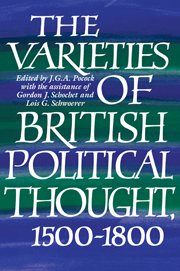Book contents
1 - The Henrician age
Published online by Cambridge University Press: 04 August 2010
Summary
The humanist debate of ‘counsel’
Renaissance political thought, insofar as it existed as a sub-discipline, was the branch of moral philosophy which taught men how to govern. Moral philosophy was adjunct to law and theology, and was closely related to logical philosophy, itself divided into dialectic and rhetoric. The Ciceronian debate on ‘office and duty’ was central, but so was the link between politics and rhetoric. Sir Thomas Elyot claimed that young noblemen, by the use of rhetoric, might rival Cicero and Quintilian through their ability to speak wisely whenever and wherever required, whether acting as courtiers, counsellors or administrators. George Cavendish, Wolsey's gentleman-usher and earliest biographer, said of his master, ‘He had a special gift of natural eloquence with a filed tongue to pronounce the same, that he was able with the same to persuade and allure all men to his purpose’.
Dialectic was the technique of rigorous argument, rhetoric the art of speaking well. If the former was a clenched fist, the latter was an open hand. By means of rhetoric, kings, courtiers and patrons might be influenced and loyalty and obedience induced in clients and subordinates. Politics and discourse were therefore closely related. As Count Ludovico advised in Castiglione's Il libro del cortegiano, the courtier unable to mould language like wax after his own mind’ would fail. The ‘greatness and gorgeousness of an Oration’ was that ‘at the first shew’ of the words, their dignity and brightness would appear like ‘tables of painting placed in their good and natural light’.
- Type
- Chapter
- Information
- The Varieties of British Political Thought, 1500–1800 , pp. 13 - 46Publisher: Cambridge University PressPrint publication year: 1994
- 9
- Cited by



